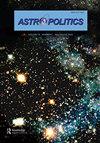Emerging European Space Agencies in the Framework of Geopolitics of Outer Space
Q3 Social Sciences
引用次数: 0
Abstract
ABSTRACT The increasing number of national space agencies, which is particularly visible in the last decade, is an important recent trend in space activities. Although one of the most frequently mentioned concepts in contemporary space activities is New Space, which emphasizes new technologies, transformation of strategic planning, and the commercial sphere, the original state structures associated with state actors, national space agencies or other governmental entities focused on space, remain indispensable elements for implementing space activities. The European cases presented in this study- Luxembourg, Portugal, and Greece- demonstrate the importance of national agencies in areas of implementing national space strategy, supporting the space sector, and representing national and international interests. The cases of Luxembourg and Portugal highlight the use the New Space transformation to prioritize the economic sphere complemented by diplomatic, scientific, and technological pursuits. Their approach is based on finding and exploiting a void in the space market and leveraging historically developed capacities in the field. In contrast, unsuccessful national space agencies can be observed in the same group of cases, Greece being the example. By comparing differences between successful and unsuccessful national space agencies, key insights into the effectiveness of such agencies are identified and discussed.外层空间地缘政治框架下的新兴欧洲空间机构
国家空间机构的数量日益增加,这在过去十年中尤为明显,是空间活动的一个重要趋势。虽然当代空间活动中最常提到的概念之一是强调新技术、战略规划转变和商业领域的新空间,但与国家行动者、国家空间机构或其他以空间为重点的政府实体有关的原有国家结构仍然是执行空间活动不可或缺的因素。本研究提出的欧洲案例- -卢森堡、葡萄牙和希腊- -表明了国家机构在实施国家空间战略、支持空间部门以及代表国家和国际利益等领域的重要性。卢森堡和葡萄牙的案例突出了利用新空间转型来优先考虑经济领域,并辅以外交、科学和技术追求。它们的做法基于发现和利用空间市场的空白,并利用该领域历史上发展起来的能力。相比之下,在同一组案例中可以看到不成功的国家空间机构,希腊就是一个例子。通过比较成功和不成功的国家空间机构之间的差异,确定并讨论了对这些机构有效性的关键见解。
本文章由计算机程序翻译,如有差异,请以英文原文为准。
求助全文
约1分钟内获得全文
求助全文
来源期刊

Astropolitics
Social Sciences-Political Science and International Relations
CiteScore
1.20
自引率
0.00%
发文量
2
期刊介绍:
Astropolitics: The International Journal of Space Politics and Policy is a peer-reviewed academic journal. The journal is dedicated to policy relevant and interdisciplinary analysis of civil, commercial, military, and intelligence space activities. Committed to the highest editorial standards, Astropolitics is the international journal of choice for the academic, policy-maker and professional in the space community.
 求助内容:
求助内容: 应助结果提醒方式:
应助结果提醒方式:


